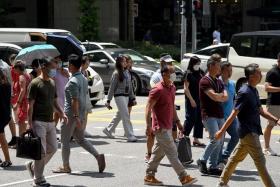Reimagining the workplace of the future
As Covid-19 cases remain low and more employees return to the office, the premises must evolve into a space that enables community-building, innovation and problem-solving
The rise of the Covid-19 pandemic around the world has forced many companies into remote-working set-ups, following mandatory restrictions from governments that have prevented workers from returning to the office.
In Singapore, 85 per cent of the workforce had to abruptly make the switch to telecommuting after circuit breaker measures were instituted in early April.
This overnight exodus left many office spaces abandoned, and with the situation showing no signs of abating, the economic ramifications of the pandemic meant that some companies were forced to move out of their offices altogether.
Office vacancies rose to 12.1 per cent at the end of Q2 amid stagnant rents, leaving commercial real estate owners worried as to how they ought to make the best use of their empty offices now sitting idle.
Fast forward to last month, thanks to the number of cases in the community remaining low, more employees were allowed to return to the workplace, albeit with limitations such as safe distancing restrictions and staggered working hours.
CANNOT SOCIALISE
Unispace research shows that 63 per cent of respondents regard the inability to socialise and make meaningful connections at work as the top internal challenge in the new working norm.
This calls into question what the new, redefined meaning of "office" will be in a post-Covid-19 world.
As many employees have shown to be more productive when completing focused work at home, the office of the future must evolve into a space that enables community-building, innovation, and problem-solving.
As part of this proposed paradigm shift, the physical layout of the office should be reimagined to maximise opportunities for interaction, socialisation, and the fostering of a more vibrant culture within the company.
The addition of communal amenities such as team zones, project rooms, innovation spaces and cafeterias can all contribute towards improving employee satisfaction and bolstering engagement, which has also been shown to have a direct correlation with a company's performance and profitability.
Additionally, following the lessons we have learnt from the pandemic, existing office spaces must also be retrofitted with the appropriate measures and interventions to ensure employee safety as they gradually return to the workplace.
With all of this in mind, it now appears that the downtime in office occupancy could serve as a rare opportunity for businesses to institute these design modifications more seamlessly into the workplace.
Previously, such changes may have meant that companies would be able to operate at only a fraction of their usual capacity due to the disruptions that large-scale upgrading efforts would bring to the office.
However, with teams continuing to split their time between the office and their homes for the foreseeable future, such changes will be much easier to implement.
Of course, challenges still exist in the implementation of office upgrades, and many companies, having just been given the green light to return to the office, may not know quite where to start.
The likelihood is that the changes being brought about by Covid-19 may not just be for the foreseeable future - the way we do business may well see a long-term shift.
It is therefore prudent for businesses to not treat this situation as a one-off and implement the changes needed to create a secure and safe environment for employees, for both now and in the future.
Working with partners that have the expertise in strategising, designing, and delivering great workplaces can be a great way to streamline the process and transform the office space into one that is not only dynamic and inspiring, but sensitive to current and future realities.
In essence, companies must work towards staying nimble in their operations, so as to ensure they are ready to face any obstacles that may lie ahead and continue to thrive as the world transitions into a new age of work.
The writer is the managing director of Asia at Unispace, a global business and commercial interior design firm.
Get The New Paper on your phone with the free TNP app. Download from the Apple App Store or Google Play Store now


